For David Goodrich, It’s a Small, Small World
January 2, 2022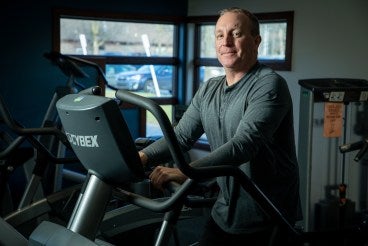
By: Val Enti
Categories: Cardiovascular Health
Dave Goodrich, 53, is a small-town guy. Born and raised in Montague, he lives and works in Whitehall, just a few miles down the road. Goodrich is an active person. In addition to being an assistant football coach, he teaches high school Physical Education, Sports Psychology, Fitness, and Health. He also knows many people in his community and is “well-connected.”
Goodrich is thankful for those connections because they helped save his life when he suffered and survived a “Widow Maker” heart attack.
The Day of the Widow Maker
It was 2021 Homecoming Week, and many events were happening at the high school. Goodrich admits that he tends to burn the candle at both ends, and that he was feeling tired and overwhelmed. His chest felt tight on the day of the heart attack, and a couple of days before, he had felt some chest pressure.
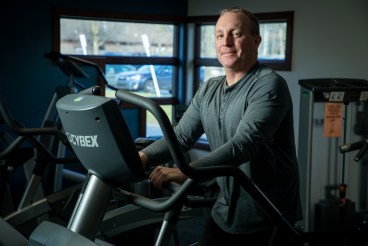
“I woke up Tuesday, Sept. 30 on the ornery side. I didn’t sleep well, and I felt a little agitated,” he remembered.
After doing a few weight-lifting sets along with his students in a class he was teaching, his heart “felt a bit of an ache.” To check his condition, he thought he would get fresh air during lunch by biking for a few minutes along the bike path near the school. During his ride, Goodrich’s body spoke to him, again.
“After about 10 minutes, I had a moment when my chest felt like it was in a vice…like an elephant on my chest,” said Goodrich.
A Little Help from His Friends
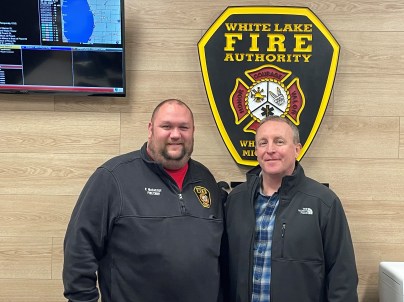
He stopped immediately and called a friend, Pete McCarthy, who also happens to be the fire chief of the White Lake Fire Authority. Goodrich told his friend he wanted to stop by to say hi [but he really wanted McCarthy to take his blood pressure]. McCarthy was busy at the time, and Goodrich told him he would contact him later in the day.
“I went another 100 yards on my bike, and suddenly my chest pain was extensive. I had shooting pain up through my neck and shoulder blades, and my left arm was completely numb. I called Pete back and told him I was ‘having an issue with my heart.’ Pete asked me a couple of questions and said, ‘Stay right there.’”
Goodrich immediately got off his bike and began sweating profusely. He also had nausea and chills. “I thought, I’m in trouble.”
McCarthy showed up immediately, took Goodrich’s blood pressure (it was over 180) and pulse, and waited for medical backup. Then a Pro Med ambulance showed up, and of course, Goodrich also knew the EMT. He calmed down once he was in the ambulance on the way to Mercy Health Muskegon’s Emergency Department (ED).
Cardiac Care
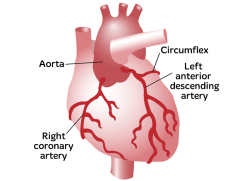
“In the ER doctors and nurses came in and talked to me and ran tests. I told them that we don’t have a family history of heart disease, but we do have a history of high cholesterol. I had been on a statin (drugs that lower your cholesterol) briefly in 2013.”
It turns out that Goodrich had gone three years without a check-up. “The bottom line was my cholesterol was high, and my LDL was twice what it should be. And my enzymes showed that my heart was under stress.” The ED physician decided to keep Goodrich overnight.
While in the ED, Cardiologist Douglas Stewart, MD, and his team went to see Goodrich. Amazingly, one of the students shadowing Dr. Stewart was one of Goodrich’s former students.
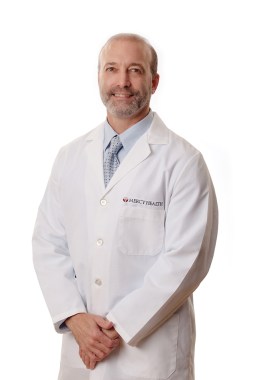
“Dr. Stewart’s bedside manner was very good. He calmed me down. He said that he was going to catheterize me the next day and see what was going on. If it was a textbook blockage, then he might stent me right away.”
The hospital was at capacity due to high number of illnesses and COVID-19, so Goodrich spent the night in the ER.
“I got to see my own version of the TV show ER. My wife came to see me and updated my kids, sisters, and school personal. I was monitored by medical staff appropriately, but I didn’t sleep well.”
Procedure #1
On the day of the catheterization, one of the medical staff in the room was a parent of one of Goodrich’s students. “Seeing so many people I knew was comforting…a sign that things were going to be okay,” he recalled.
The procedure was short. Afterward “Dr. Stuart came in and told me that two of my arteries were blocked, and the one called the widow maker was 99-percent blocked. I had two options: catheterization and stents or coronary bypass surgery.” Each had its advantages.
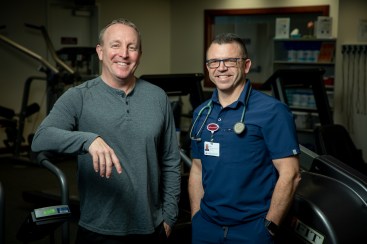
Throughout that day, other specialists came in to discuss the pros and cons of his options with Goodrich. He chose stents.
Mercy Health Muskegon Cardiac Rehab Coordinator Rick Hyatt (seen with Dave at right) went to see Goodrich that day too. “We’ve known each other since high school…he knows me as a person and what I’m like. He told me about post-op rehab and medications, so I was prepared and knew what would be expected of me.”
Procedure #2 and Follow-up Care
On Thursday, the procedure went well, but instead of getting two stents Goodrich received four. “I was very happy with my care. I trust Mercy Health. Knowing people along the way helped too.”
By Saturday, Goodrich was home.
At cardiac rehab, the personable team teased Goodrich. “We have our eyes on you. Rick already told us about you.” They knew he would try to push the envelope, which he did on more than one occasion.
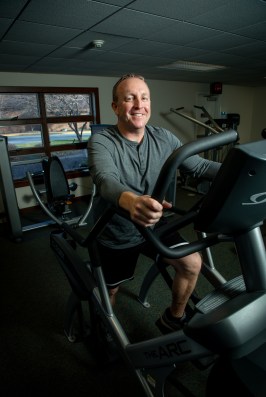
Goodrich is grateful for the care he received in the Mercy Health Heart Center. “I did what they told me to do. I completed my 12 sessions, and I’m feeling good now.”
Would he go back to Mercy Health and work with that cardiac team again?
“Absolutely. The nurses on my floor overwhelmed me with attention and support. They have a lot of empathy and compassion. I am happy with how my team did my procedure, and the post-op follow-up and continued follow-ups have been great.”
In the future, Goodrich has plans to get more sleep and watch his diet more closely. He will be on a statin from now on.
Reflecting on his narrow escape, this coach offers serious advice to readers:
“Genetics don’t discriminate. Take preventive measures. Get a yearly checkup and bloodwork. Know your family history and be mindful of your diet and exercise.”
Great advice from one so young.



